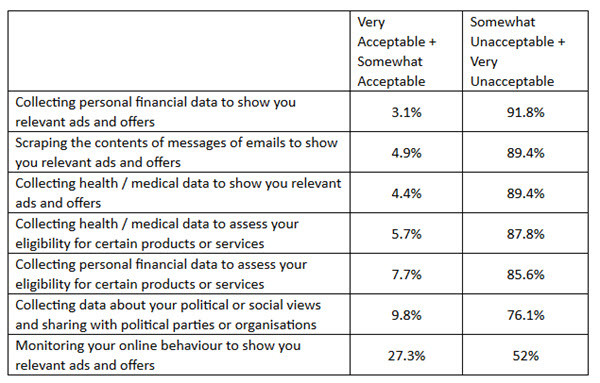
Image credit: Jonathan Denney
New polling from Roy Morgan, released early to Crikey for our Prying Eyes series, shows Australians are deeply concerned about the way their personal information is exploited by corporations — but unwilling or unable to take action themselves to protect it.
Polling by Roy Morgan, based on a sample size of 967 people, examined a number of issues around attitudes to online privacy and people’s responses to the way their information was being provided to, and used by, corporations. And Australians are deeply worried about their data. For example, between 85-92% of respondents regarded it as “somewhat unacceptable” or “very unacceptable” that companies collect personal financial data, scrape the contents of emails, or collect health and medical data for the purposes of displaying targeted advertising to people, or collect such data to assess people’s eligibility for certain products or services. Similarly, 76% of people objected to the collection of data about political or social views to share with political parties; 52% objected to “monitoring your online behaviour to show you relevant ads and offers”.
 When asked specifically about how acceptable it is for companies to undertake the following activities with relation to their personal data,responses where for the most part clearly indicating that the activity is not acceptable. Source: 967 Australians interviewed as part of the Roy Morgan Privacy Report drawn from the 50,000 annual interviews conducted as part of the annual Roy Morgan Single Source.
When asked specifically about how acceptable it is for companies to undertake the following activities with relation to their personal data,responses where for the most part clearly indicating that the activity is not acceptable. Source: 967 Australians interviewed as part of the Roy Morgan Privacy Report drawn from the 50,000 annual interviews conducted as part of the annual Roy Morgan Single Source.
Nearly 65% of people were wary of providing personal information to online newspapers or news sites; and around 58% were reluctant to provide information to social networking sites or shopping sites. About 50% were reluctant to provide information to financial institutions. Australians were more relaxed about providing personal information to government websites (54% comfortable), and almost 47% of people were comfortable providing information to medical and health services websites.
However, for all their concerns, Australians do little to protect themselves. Just 15% say they read the terms and conditions of online products or services; nearly a third said they accept terms and conditions even if uncomfortable with them. Less than a quarter of people use incognito browsers (which don’t store history) regularly, though 57% often or sometimes clear their browser history, and 14% do it always, and over 55% say they delete cookies from their browsers often or sometimes. Around a third of people use ad blockers or check their permission settings. But over half — 52% — say they do not take the most basic privacy protection, using a VPN, because they don’t know how, and another 11% have no interest in using one. Just 11% use a VPN always or often — a lower figure than polling from other sources, which suggested closer to 20% of people used VPNs.
And most people weren’t sure about how a range of online products and services use their data, with only Facebook (39%) and Google (46%) scoring below half on the proportion of respondents “not sure” about how they use their data. However, between around 80-90% of people had an understanding that companies had the ability to follow a person’s activities across many sites and swapped information about them with third parties so that the third parties can target advertising or use it for other purposes. But mobile and tablets seemed a particular area of ignorance, with around a third of people not understanding about permissions or information sharing by mobile apps.
Australians also regarded different forms of personal data differently. Between 70-80% said that family photos and photos of children, mobile phone numbers, messages, financial history, phone contacts and medical history should never be shared. Around half said location, purchase history, phone number and browser history should never be shared. Then there was information that people were more relaxed about sharing: political views, sexual orientation, gender, name, religion and email address.
Clearly, however, Australians want companies to give them more control over their own data. Over 95% of people wanted companies to give them options to “opt out” of providing certain kinds of information, and to be open about how they used data to assess people’s eligibility or exclude from products/services; 90% want them to only collect information they absolutely need to provide their product or service.









The law should be protecting us in respect of data privacy. I do not feel sufficiently qualified to do it myself. I rate myself as reasonably competent with technology. But I have little idea how it works. And when I do try to take steps to better protect my data privacy, I often encounter bewilderingly impenetrable ways in which to do that. Or, if one does succeed, that then reduces the functionality of the technology.
In my view, the solution is simple. The law ought to be that a user must knowingly opt in to data sharing and the like, not be required to amateurishly attempt it yourself, often without ever knowing whether the steps one takes were the right steps or how effective personal action was.
Yes, BA
Odd, Bernard considers any request to “interfere” with “choices” of consumers when it comes to sugar and gambling as the Nanny State gone mad!
Surely demanding the government intervene on behalf of consumers who are simply making their own choices when failing to look after their online privacy would just be another knee-jerk Nanny State reaction…isn’t that right Bernard?
We cannot uninvent the Internet and with out the total data intrusiveness most have come to deem normal – from mobile to F/B et al – it would not function as we have come to expect/demand.
The only solution is the diktat that our information is to be our copyright, with the usual attributes.
Its use can be licensed, with suitable peppercorn charges but the main change must be the full disclosure, at short notice, of all current holdings.
Just to ensure that we are not being traduced.